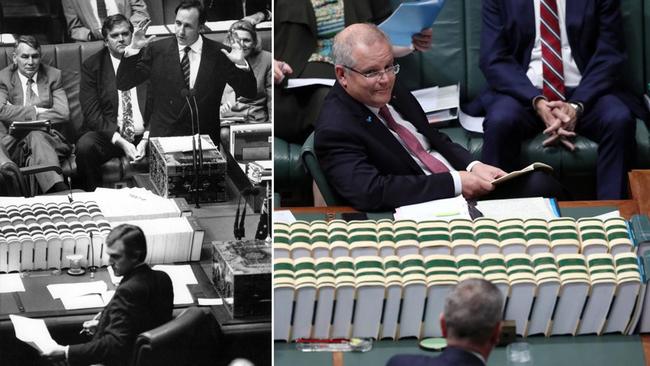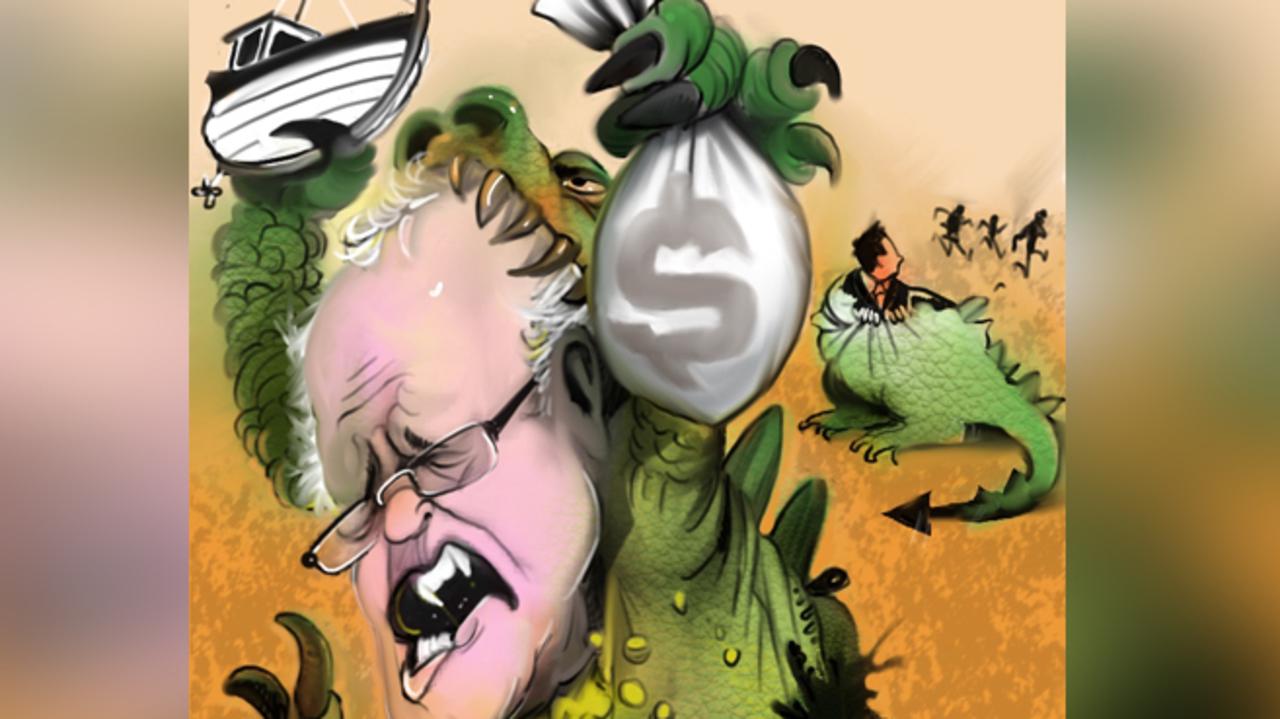Morrison fancies Keating role, seeing Shorten as Hewson

Years ago another prime minister won a supposedly unwinnable election against an opposition that had been locked out of office for years, had regrouped, was policy driven, united and looked ready to govern.
That was Paul Keating against John Hewson. This time around, Scott Morrison is hoping Bill Shorten will be his Hewson. It falls to the Opposition Leader now not to lose the unlosable election, not to underestimate the Prime Minister, not to be complacent. Morrison’s task seems as insurmountable as Keating’s was in 1993 — although, as former finance minister Nick Minchin noted recently, every election is winnable.
Remarkably, amid the rubble, despite the ongoing rage and threats of retribution over Malcolm Turnbull’s dismissal, there is a glimmer of hope among Liberal MPs that they can survive. No one is trying harder than Morrison to force people to think about what he offers by way of continuity and renewal, to forget about Turnbull and focus squarely on what a Shorten Labor government would mean, when the time comes to put their paper in the ballot box.
Morrison has dominated all forms of media, old and new, from the moment he assumed office, in the hope he can get people to switch back on. When it comes to Morrison, PM stands for Perpetual Motion. As a long-time observer of leaders and footballers, he has learned what works best, especially if time is of the essence, outflanking his opponents from day one. Not quite crash or crash through. More like a barrel rolling down a hill.
He watched John Howard and his responses to the unexpected. Howard knew how to use issues to connect with the community and he didn’t muck around when events blew his way.
Morrison watched Turnbull and his slow decision-making. Morrison moves quickly, partly because that is his nature but mainly because he doesn’t have to deal with the constraints that Turnbull had imposed on his leadership, or those he imposed on himself. Morrison has — while he continues to make the right calls at least — freedom of movement and speech. No more waiting for Mathias Cormann or Peter Dutton to give him the all-clear. They no longer hold sway over the government. Morrison is neither beholden nor hostage to anyone while his political judgment remains true to Liberal values and reflects community sentiment.
Morrison also watched Tony Abbott misread community sentiment. Australia Day for Morrison does not mean knighthoods for English princes. His approach emphasises unity around achievements, puts uppity councils in their place, and tries to assuage the legitimate concerns of indigenous Australians by floating the prospect of another special day to recognise them and their culture. It won’t please everyone and it certainly didn’t find instant favour with Abbott, but symbols and tokens abounded with another nimble display — again short-circuiting the usual processes — after Byron Shire Council announced it was shifting its “celebrations” to January 25.
Unlike others, the PM appears undaunted by the weight of the office and has a deep appreciation of the power of incumbency. He has made full use of it without misfiring yet, although that is bound to come. The test then will be how sprightly he is with reparations.
Another role model for Morrison is the original Mr Perpetual Motion, international dual code lock forward Ray Price, renowned for his hard, intimidating style of rugby. His clever tactical game has meant Labor has been unable to get a bead on him. Instead it is forced to follow his lead. This buys him time to work out a longer-term strategy, such as whether to have a mini-budget, what to do about the money left over from the failed upper-end company tax cuts, immigration, energy and religious freedom. PM mode was obvious last week with the royal commission into aged care, quickly followed by the decision on strawberries, which led to increased penalties for food tampering, taking a 10-year sentence to 15. Morrison discussed it with Attorney-General Christian Porter one day and it was passed by a special partyroom meeting the next.
Labor had no choice but to back it. There was no point being picky about the hierarchy of sentencing, which troubled legal affairs spokesman Mark Dreyfus, to ask why, if 10 years hadn’t worked, another five would. Similarly, Joel Fitzgibbon’s concerns about rockmelon growers, who have been devastated as a result of a listeria breakout that actually caused fatalities and who have received no help, also failed to register.
The strawberry steamroller gazumped Shorten’s super deal for women, while the debate on Australia Day, four months ahead of schedule, quashed Labor’s announcement on university funding.
Labor is not spooked. Not yet anyway. “Nothing fundamentally alters the dynamics,” one Labor frontbencher says. Labor MPs don’t discount the possibility of problems on their side, particularly following leaked minutes on the trade debate in caucus which was a shot across Shorten’s bow; however, they predict Liberal troubles will re-emerge with a vengeance over religious freedom.
And despite the final budget outcome showing a revenue surge, they also predict that Morrison will not be able to rely on buying his way out of problems, as he tried to do with the Catholic education sector. They should not count on that.
If Shorten is the only one going to the election promising higher taxes, then he could well turn out to be Morrison’s Hewson. That depends, of course, on whether Morrison’s campaign skills trump Shorten’s. And whether the government’s resources on the ground can even come close to matching Labor’s formidable combination of money, the unions and GetUp.
Labor is happy to be backseat-driving the Wentworth by-election in the hope that high-profile independent Kerryn Phelps does the heavy lifting and cruels Morrison’s momentum. In a seat with a margin of 17.5 per cent, the Liberals have a high-quality candidate in Dave Sharma. Still, Labor believes the Turnbull factor will help deliver it to Phelps.
At least the potential Liberal loss is being factored in, so the government appears to have the expectations game beaten, unlike the last critical by-elections. That will not make defeat, if it comes, easier to stomach or brush aside.
Other governments in strife have lost seats thought impregnable. Gough Whitlam lost Bass in Tasmania in June 1975 when Labor’s primary vote fell by 17.5 per cent. In March 1995, Keating lost the seat of Canberra when Labor’s primary vote fell by 21.78 per cent. Neither had the additional stress factor of a one-seat majority.
If the government loses Wentworth, Labor will go all out to heighten the sense of instability by trying to engineer a vote of no-confidence or the loss of a vote on a substantive issue.
Failing that, despite the difficulty in predicting what Morrison will do next, and despite overlapping with the NSW election campaign, Labor will ready itself for an election announcement around Australia Day.



To join the conversation, please log in. Don't have an account? Register
Join the conversation, you are commenting as Logout